
September 11, 2025: Theatre Yesterday and Today, by Ron Fassler.
It’s hard to believe that by next Spring it will have been twenty-five years since The Producers opened on Broadway, the musical version of Mel Brooks’s 1968 comedy film classic. At age seventy-four, it heralded for Brooks a triumphant return to prominence as the figurehead of a fabulous team that blew into town like a tornado. Under Susan Stroman’s assured direction and inspired choreography, its controlled anarchy had audiences in howls of laughter (with thousands willing to do anything for a ticket). Its exceptionally funny book, co-written by Brooks and Thomas Meehan—who had written the charming libretto for Annie—was a jubilant pairing. Brooks, who doesn’t read or write music, also wrote the first-rate score, both music and lyrics. He received invaluable assistance from music director Glen Kelly, who took Brooks’s humming tunes into a tape recorder and turned them into real songs.*
Nathan Lane and Matthew Broderick were ideal casting in the roles of Max Bialystock and Leo Bloom, first created by Zero Mostel and Gene Wilder. They were adeptly abetted by stellar turns from Gary Beach, Roger Bart, Brad Oscar, and Cady Huffman—all five Tony-nominated. The musical would win twelve Tonys which even the mighty Hamilton couldn’t tie or surpass. Its wins in the double-digits in every category for which it was nominated is something never achieved before or since. The Producers was a juggernaut that ushered in the era of $400 tickets at the box office and, when it had Lane and Broderick as its Max and Leo, remained a tough a ticket from the first preview to their last performance together a year later.
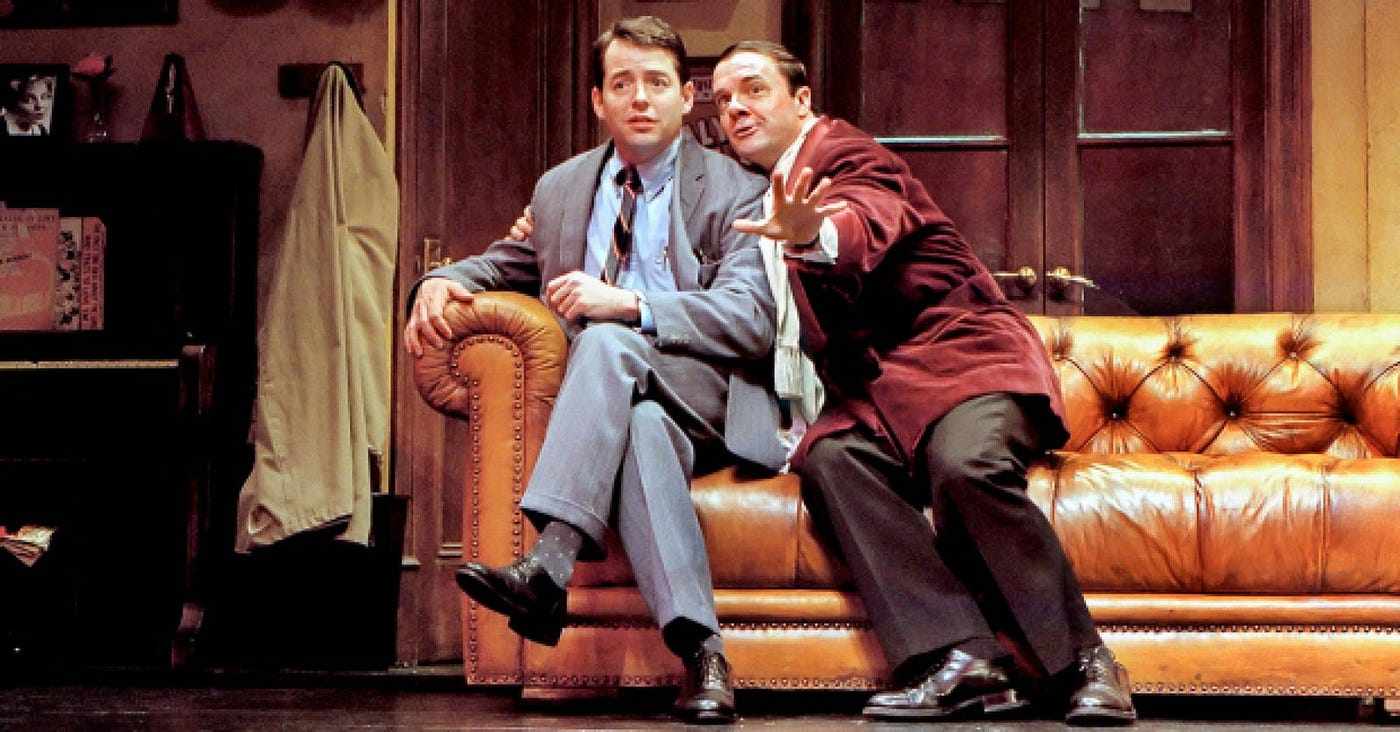
And though it managed 2,502 performances and a run of six years, there was always some degree of difficulty finding the right actors as replacements who would insure strong box office. No such problems have existed for shows that came after not so dependent on casting and chemistry between its co-leads. Wicked’s done just fine since Idina Menzel and Kristin Chenoweth said goodbye, and other long-running shows like The Lion King and The Book of Mormon, having never relied upon stars to begin with, haven’t seen any such trouble. When The Producers first opened, it seemed like it would run forever. And though six years is nothing to sneeze it, considering how it started, the feeling was that it should have lasted longer.
This preamble is all to set up and answer the question of whether The Producers was some sort of freak of nature; a musical married to a moment in time when people really needed to laugh. Especially when five months into its sold-out run, New York suffered the 9/11 terrorist attack, turning laughter into an all-too precious commodity to deal with the sense of loss, fear and anger. It was The Producers that led the charge in Broadway’s darkest hour, two decades before the Covid shut down, to help revive tourism and literally save Broadway. But now in 2025, would its humor seem dated? Think of all that’s lampooned: Jews, gays, women as sex objects, and—of course—Nazis. How does all that go over now that campaigns have been erected to combat such stereotypes?
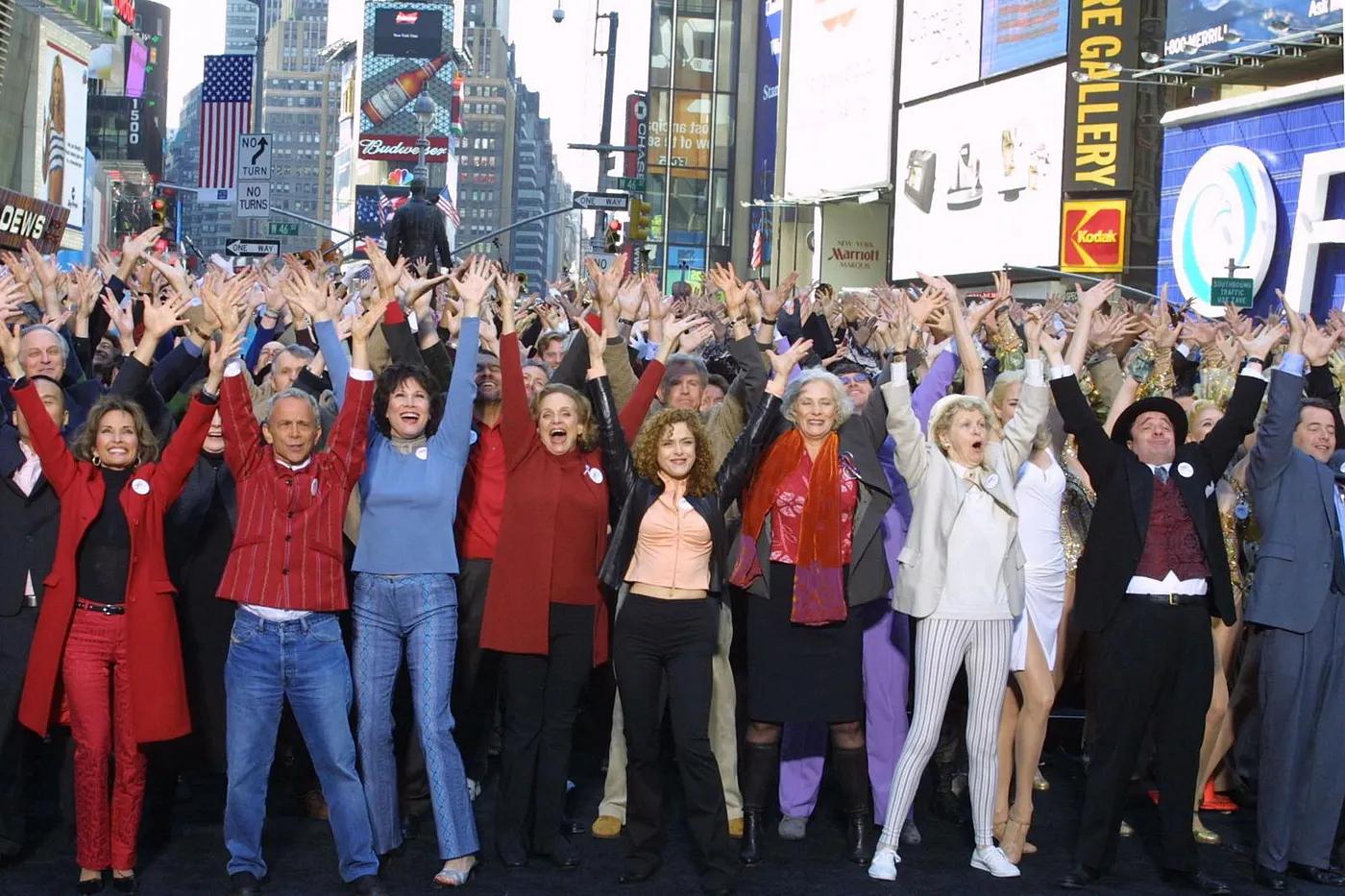
Are there actors built nowadays to even take on the Brooksian-style absurdity that has pretty much fallen out of favor? Think how impossible it would be to film Blazing Saddles in our current PC environment. And what of Susan Stroman’s brilliant staging? Would someone else be able to be as clever and keep its anarchic spirit from sinking under the weight of its own self-reference?
Well, the answer comes from London. Two nights ago, on my final night of a weeklong vacation, I got to see what the first revival of The Producers is like freed from the shackles of its original production. Director Patrick Marber has brewed a secret sauce that brims with originality while, at the same time, remains faithful to what made the musical so damn funny in 2001. The playwright of such distinguished dramas as Dealer’s Choice and Closer, Marber is also the Tony Award-winning director of Leopoldstadt, the devastating Holocaust play that played in the West End and on Broadway in 2020 and 2022, respectively. A former stand-up (who knew?), it turns out that Marber possesses exactly the right sensibility to bring the snap and crackle to something by Mel Brooks as well as interpret the intensely layered writing of Tom Stoppard.
The idea to produce The Producers for a limited engagement earlier this year at London’s prestigious Menier Chocolate Factory could easily have turned out a folly. A 200-seat house is a major challenge for a musical that, in its original production, featured an extensive scenic design seemingly essential to its success. What chance does the self-consciously overblown “Springtime for Hitler” showstopper have in a small space with little scenery? Well, in cohorts with choreographer Lorin Lattaro (whose Broadway credits include the recent revivals of Once Upon a Mattress and The Who’s Tommy), there’s no question that it can be done and still create the same gales of laughter. I was gob smacked seeing things that I never would have thought of in a million years. I should add that in 2017, I directed the show at the Priscilla Beach Theatre, a 150-year-old barn theatre in Plymouth, Massachusetts, so I’m not unfamiliar with producing The Producers on a small scale.
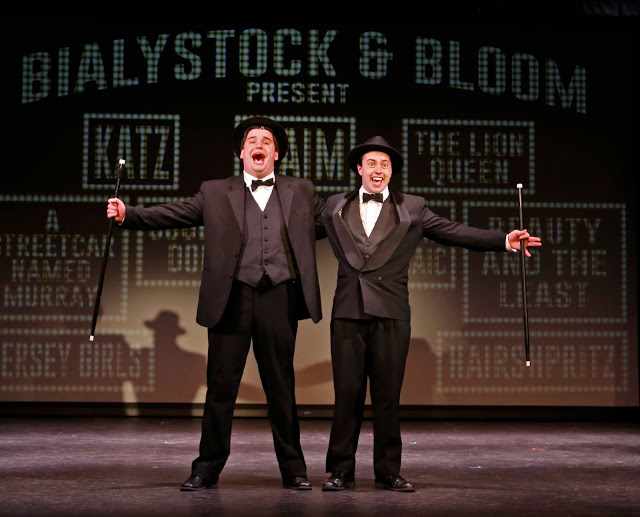
My relationship to the show goes deeper. When I saw it a month after it opened to its rave reviews, it was on a quick trip to New York from my then-home in Los Angeles. I flew in a day early and got up at 5am to get on the cancellation line (it was raining, naturally) in the hopes of getting a single ticket. I was something like twelfth in the queue, no guarantee of getting in at all, but I did . . . and not till nearly curtain time at 2pm. But I was on a mission because my sole reason for coming to town was the funeral for my best friend, Christopher Gorman, who had died a few days prior in Los Angeles of complications from AIDS. It was on his deathbed at the hospital when, in a memorable moment, I asked him if there was anything I could get him. In a weak voice, but with his unmistakable flair, he said, “Yes. A seat in the orchestra for The Producers, preferably on the aisle.” Before leaving for the funeral, his friend the actress Joanna Gleason, had designed and distributed these beautiful business-sized cards that featured his signature, “Love, Christopher,” from one of many letters he’d written her. She had it set on a card against a blue sky and clouds. I was carrying one in my wallet and before I took my seat, I found a spot downstairs in the lounge of the St. James Theatre and tucked it behind a vintage wooden sign, framed behind glass. I wanted his presence known (the sign’s still there but I checked years later, and the card must have dislodged because it’s disappeared). Before the lights went down, I looked up to the heavens in the cathedral that is a Broadway theater, and said, “This one’s for you, Christopher.”
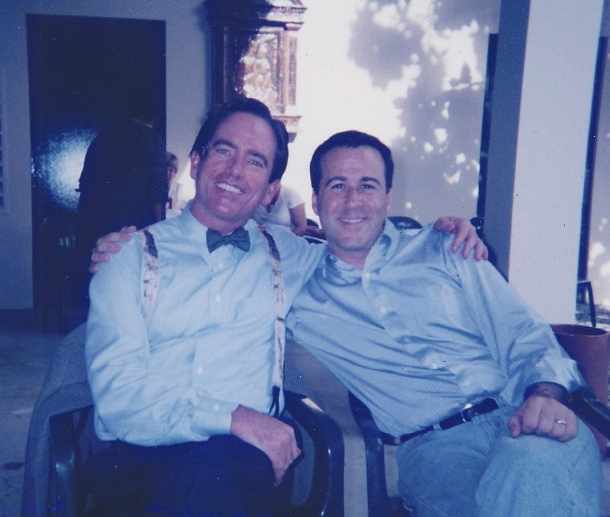
I also was a friend of the late Gary Beach, who gave a dazzling performance as Roger DeBris (“You mean that smell is you? God, if I could bottle you, I’d shove you under my armpits every day.”) and won a much-deserved Tony Award for his outrageous performance. I saw him two more times in the show; once again at the St. James when I took my son for his twelfth birthday (Gary got us the tickets), and when he joined the L.A. company and played Roger with the Max of Jason Alexander and the Leo of Martin Short (that time I took the whole family). Backstage, onstage, offstage, Gary was simply the best. The best.
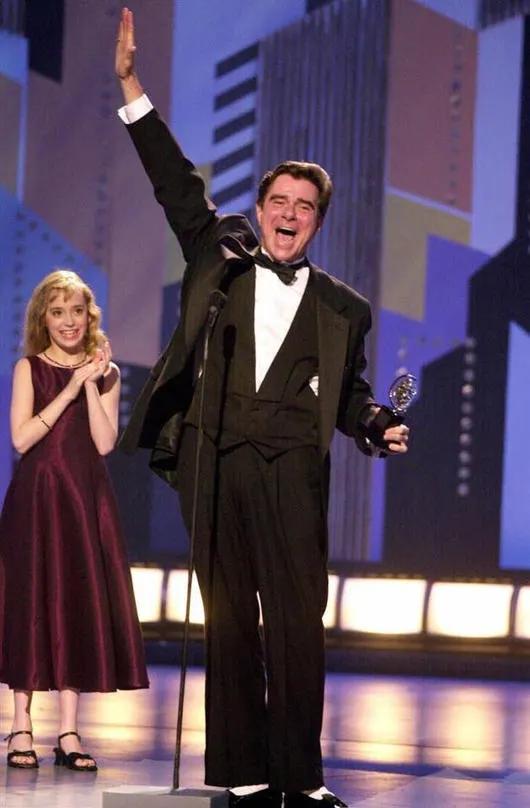
Finally—and forgive me for taking so long to get to it—my review of this new Producers:
If, like me, you get goose bumps at the sight of a lit red curtain with gold tassels that’s just waiting for a conductor to command an orchestra in a genuine Broadway-style overture, then imagine how excited I was to be seated fifth row center waiting for The Producers this past Tuesday night. London’s famous Garrick Theatre, built in 1889, doesn’t have a big stage or a deep orchestra and at 732 seats is as small as Broadway’s Booth Theatre. But here it is housing The Producers, the sort of big musical that used to regularly appear in the Golden Age of the 1950s, the era in which the show is set. When the opening chords of “Springtime for Hitler” played, even though it’s a smaller number in the pit (or, in this case, later revealed situated above the stage), the sterling Douglas Besserman orchestrations, reworked terrifically here by Larry Blank and Mark Cumberland, made my heart sing. I had such a broad smile on my face, my mind racing imagining what was in store. Feeling like this before anything happened took my optimism to new heights. Please, oh please, let this show fly!
And fly it did. The tempo for “It’s Opening Night” was right on the money. The chorus seemed to be having the time of their lives (it really is one of the best shows to be cast in as an ensemble member). And when Andy Nyman as Max Bialystock revealed himself from behind a newspaper and read aloud the reviews for his latest flop Funny Boy, a musical version of Hamlet, it was off to the races. Nyman, a relative unknown to me, is a West End regular who has thrived in such legendary roles as Tevye and Horace Vandergelder. Seen briefly as Elphaba’s father, the Governor of Munchkinland, in the recent film version of Wicked, he is a short man with a rubbery face and an excellent singing voice. His Bronx accent is fairly decent, if not site-specific, and the Jewishness he brings to the role feels thoroughly authentic. Dressed in ill-fitting clothes (I suspect he’s padded), Nyman never changes costume and wears his stained suit like a badge of honor, much as Max Bialystock would. It wasn’t long before I fell in love with him. He’s endearing but never asks the audience for its affection. He’s feral and though channeling a bit of Nathan Lane in the role, he is somewhat more relaxed. As Max, Lane was like a bulldog with a bone, no laughs were going to get by him! Nyman is content to bury a few, throwing a couple of choice ones away. Perhaps he’s pacing himself as he’s only recently returned to the show since it closed its initial engagement at the Menier Chocolate Factory in March (it began performances at the Garrick August 30th). Unshaven, unkempt, and with hair that’s plastered down in zany directions, Nyman is a disheveled mess. But when it’s time to take the stage, he stands tall. His “Betrayed,” an Act Two showstopper if there ever was one, indeed stopped the show.
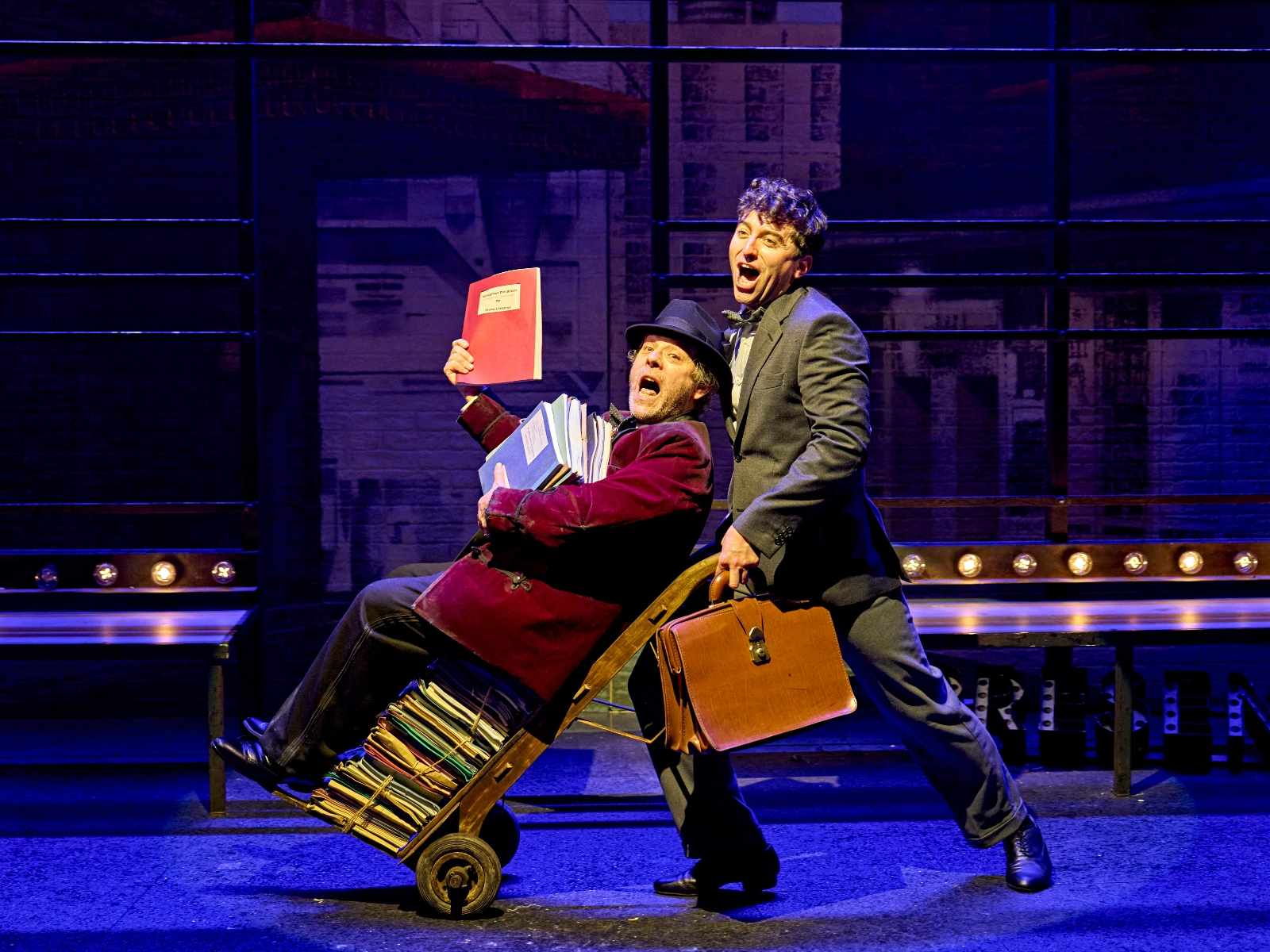
I was impressed with Marc Antolin as Leo, but it took a bit of time getting there. In his first scene, the whiny, put-on voice made me recall what drove me a little crazy about Matthew Broderick’s performance. Leo is weird enough and doesn’t need to talk in a high-pitched drone like some alien (Broderick also made this inexplicable choice when he played Finch in How to Succeed). What finally made Broderick’s Leo endearing was his innate comic timing, his sweet singing voice, and his relationship with Lane. In Antolin’s case, once he gets the chance to shine with “I Wanna Be a Producer,” he began to grow on me due not only to his singing ability, but his agile dancing. A fine tapper, choreographer Lorin Lattaro smartly takes advantage of Antolin’s skills in this area as does director Patrick Marber, having him athletically climb the walls and slink under a divan, slithering on his back, in the moments Leo’s anxiety hits its heights.
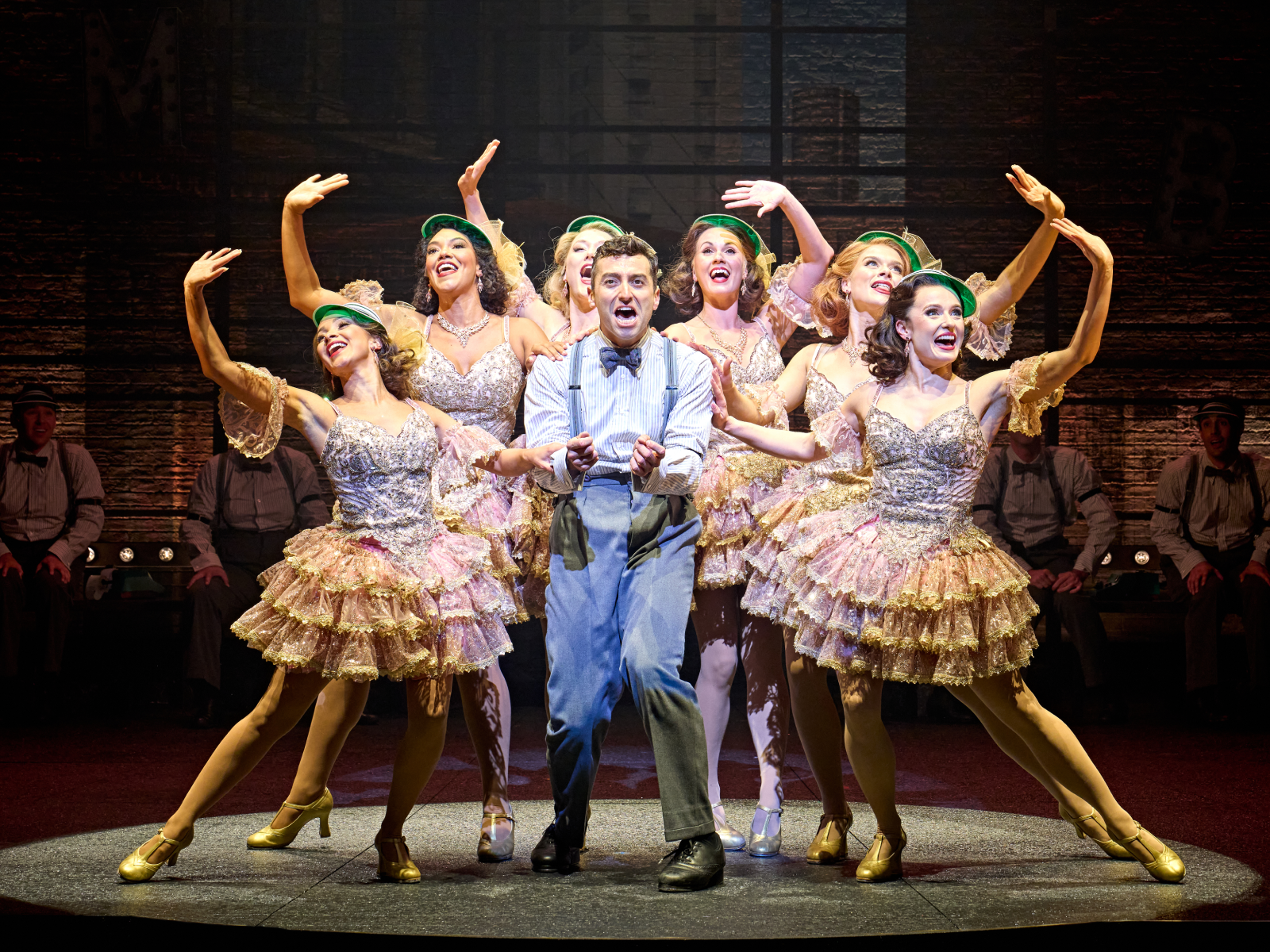
I can’t praise Harry Morrison’s Franz Liebkin more highly than saying he knocked me out. He gave something to the part I’ve never seen before—genuine menace—which only made him funnier. Playing comedy seriously is always the best way to squeeze the most authentic laughter from an audience (think about Gene Wilder’s Leo in the film version). Morrison gives a performance here that would mandate he get to play it in New York if this production crosses the pond. I can’t think of anyone else accomplishing what he does.
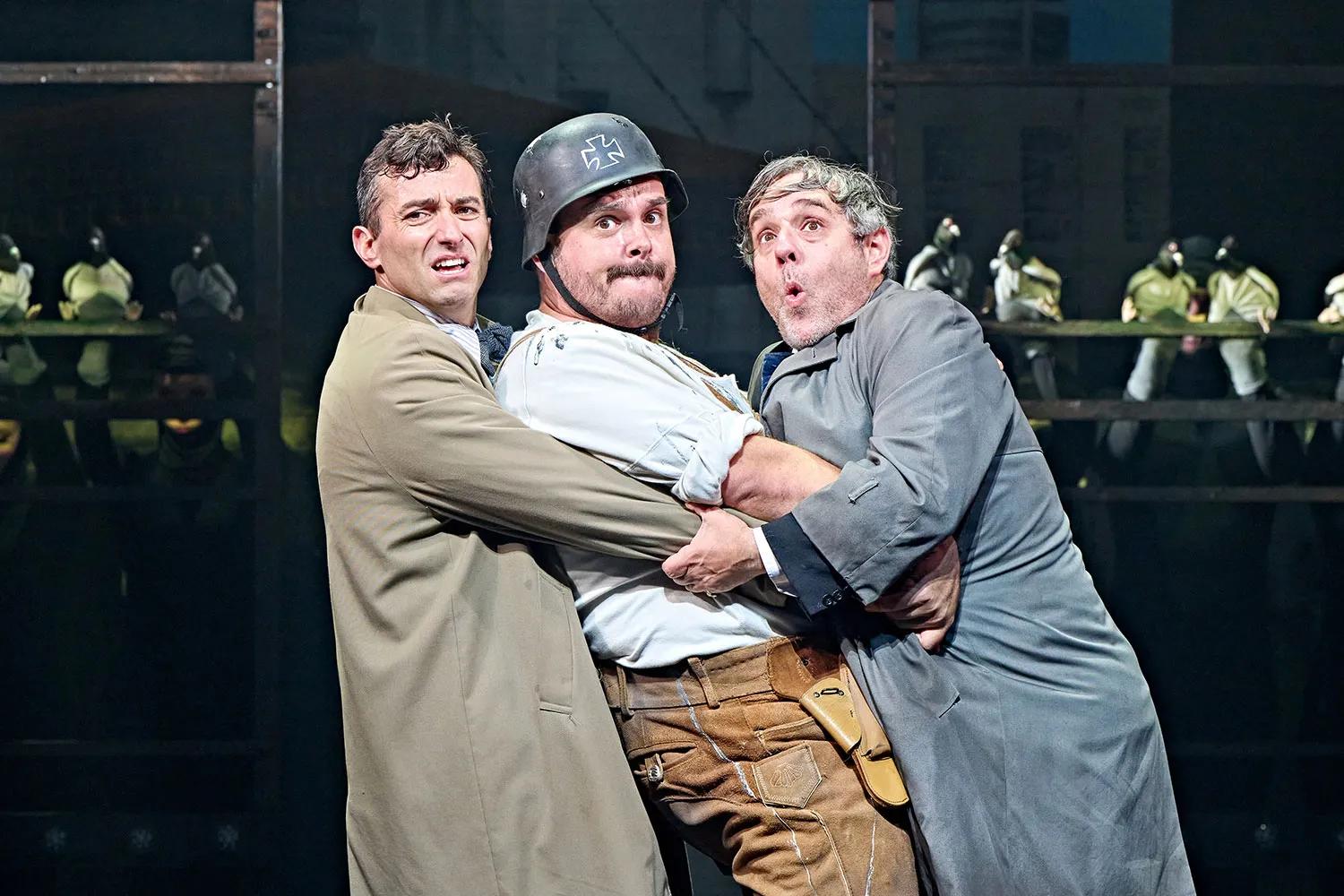
I was completely taken with Joanna Woodward’s Ulla. Not only did she use the Swedish accent to great comic effect, but she displayed something of a split personality as Ulla. At times innocent, at times as unscrupulous as Max himself, she really mined the text. A sensational singer, she sold “If You’ve Got It, Flaunt It” for all its worth.
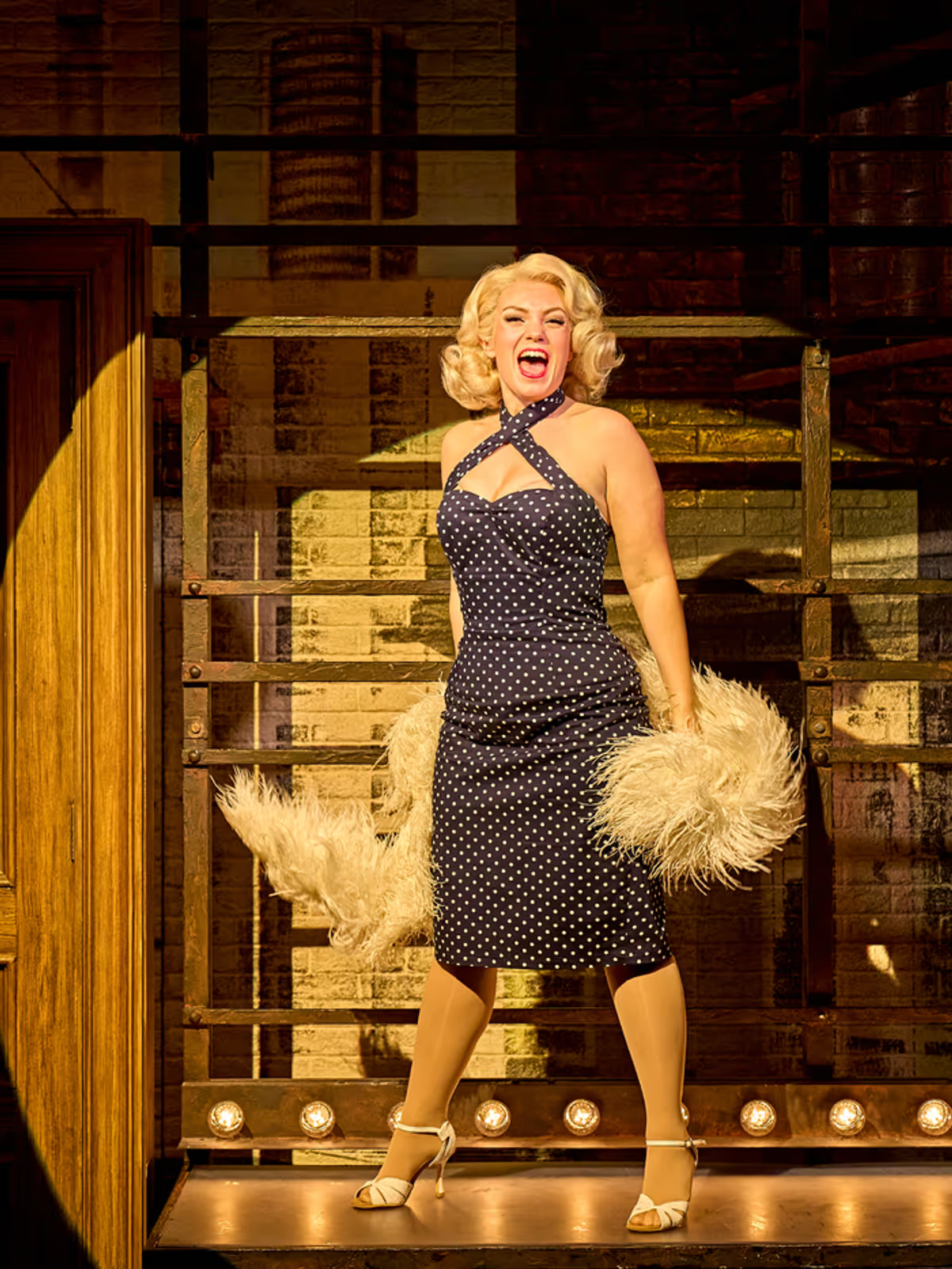
In the role that has the potential to steal the show, that of Roger DeBris, Trevor Ashley chews the scenery with relish (I don’t mean the condiment, but in his time, I imagine he’s done so). A renowned drag artist in his native Australia, he’s really in his element here and manages to actually DO Judy Garland in the section of “Springtime for Hitler” that we all know and love—in a Judy gown, no less. Rotund, with a round face that resembles Fatty Arbuckle, when he first arrives onstage as Hitler in his wig and tiny mustache, he nearly stopped the scene cold even before opening his mouth. He plays the audience like a Stradivarius. Completely in his element, he is a thorough joy.
I wish I could compliment in the same way the Carmen Ghia of Raj Ghatak, but he is the weak link among this group of actors. Erratic, he simply doesn’t have a strong take on the part. You would never know from his performance that the role has the potential to earn a talent such as Roger Bart a Tony nomination, which came his way with ease. The relationship between Roger and Carmen, so well defined and funny the first go round with Beach and Bart, is here neutered and laugh-free. The exchange about Roger’s wig (“Then why don’t you go get it, oh Wicked Witch of the West?”/“If your intention was to shoot an arrow through my heart . . . bull’s-eye!”) falls flat.
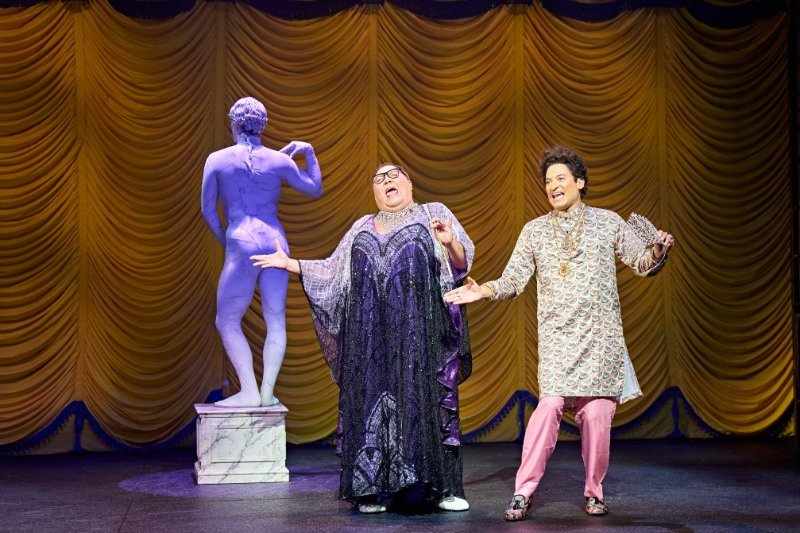
Knowing the script as well as I do, I made mental notes about which jokes were still deemed appropriate and which were vanquished. Carmen’s lingering “s” on the “yesssssss,” followed by thirty seconds of what Max describes in the film as “steam escaping,” has been cut. The old “walk this way” routine has been abandoned as well. The word spastic has been removed in “It’s Bad Luck to Say Good Luck on Opening Night" and substituted with drastic, which makes little sense lyrically (“And to trip the light fantastic we had dancers who were drastic?”). And I missed a personal favorite bit, which is when the workers at Leo’s firm are in their drudgery and one Black accountant sings a spoof of “Ol’ Man River” (“Oh, I debits all the morning…”). Not sure if that was worrisome or not. Perhaps it’s as simple as that there being no male Black actor in the cast. Also omitted is the Ugly Chorine from “I Wanna Be a Producer.” What’s substituted is Max himself coming out in drag and being rejected for the chorus—sorry, but not as funny or effective. But I guess making fun of someone’s appearance is a no-go now, even in a satiric musical.
However, many new bits were entirely welcome, two of which must be credited to Gareth Valentine, who did this production’s music supervision and dance arrangements. During “That Face,” when Leo and Ulla are dancing as if out of an old musical, the refrain of The King and I’s “Shall We Dance?” is heard. And when the auditions commence for “Springtime for Hitler,” Valentine wittily works in a bit of “I Hope I Get It” from A Chorus Line. Franz’s mechanical pigeons are gone, replaced by dancers in pigeon suits with hand puppets, hilariously choreographed (one kept pecking at Franz’s crotch where he keeps birdseed). And the juice squeezed out of one of the male staff at Roger DeBris’ house who is permanently ensconced on a pedestal as Michelangelo’s David (complete with genital appendage), is a comic gem.
Broadway’s four-time Tony-winning designer Scott Pask has done a marvelous job reconfiguring the scenery and using props to maximum effect. Multi-purposed in some cases, one transition between scenes had the safe in Max’s office (and where Leo has just stolen the money to take off for Rio) cleverly and effectively transformed into the claustrophobic cubicle that temporarily serves as Max’s prison cell. Costumes by Paul Farnsworth do justice to William Ivey Long’s originals (hard to top) and Tim Lutkin’s lighting is spot on. Praise too for an excellent sound design from Paul Groothuis.
Designed as a throwback musical, the intention of The Producers was always to emphasize the comedy in musical comedy with nothing more on its mind than entertainment. In some reviews, the original production was chided as desperate to do anything for a laugh, not surprising when you consider that Mel Brooks was at all the rehearsals, a whirling dervish even as a septuagenarian. Here, with Brooks removed from the equation, Marber’s effort to bring out the characters more and sacrifice a laugh or two is worth celebrating. One example is that in Stroman’s staging of the climactic courtroom scene when Leo sings“Till Him”to Max, the Old Ladies start singing behind Max as backup singers when he takes over the song. After a strong crescendo, Max tells them, “Don’t help me.” By Marber cutting that surefire laugh, the momentum of what Max is saying to Leo keeps its integrity. One less laugh in a show chock full of them isn’t going to matter when you can score points on the intimacy of the show’s most significant relationship, the platonic love affair between Leo and Max.
* Funny story from Glen Kelly about working on the score: “Mel is a better musician than he realizes. Once I came home and on my answering machine there was Mel, whistling the tune to a song. Then there was a second message from Mel, with a slightly different version of the tune. About an hour separated the two messages. I taped them and went to my piano to try and sort them out. I then discovered that even though Mel had whistled these two version about an hour apart, they were in exactly the same key, a feat which I couldn’t do to save my life.”
The Producers is playing at London’s Garrick Theatre until February 21, 2026. If planning to see it on a visit next spring, there's a good chance it will extend. ☺️
Ron Fassler is the author of the recently published The Show Goes On: Broadway Hirings, Firings and Replacements. For news and "Theatre Yesterday and Today" columns when they break, please hit the FOLLOW button.

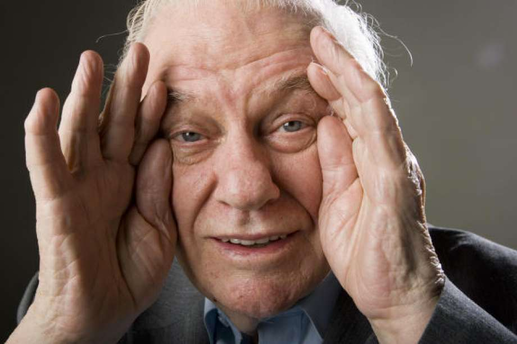

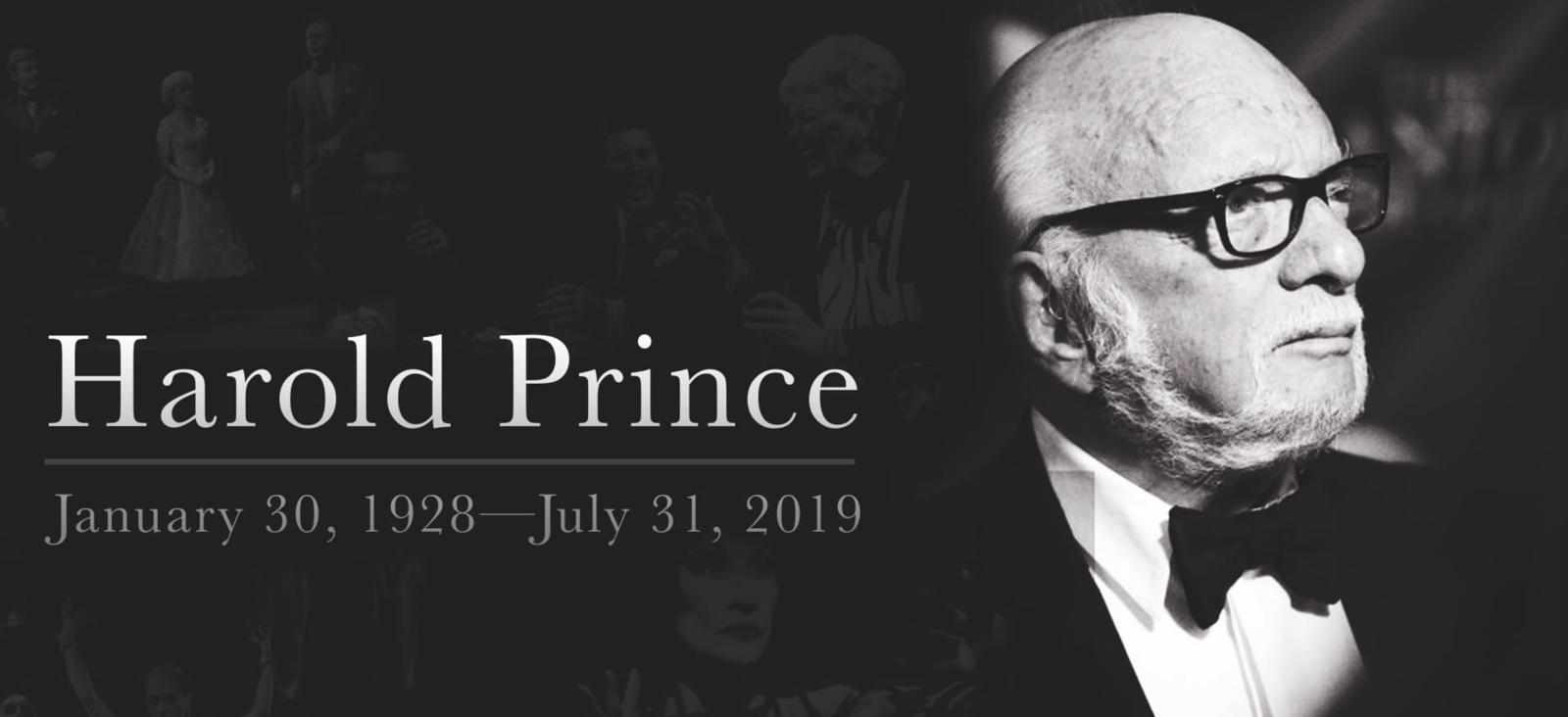
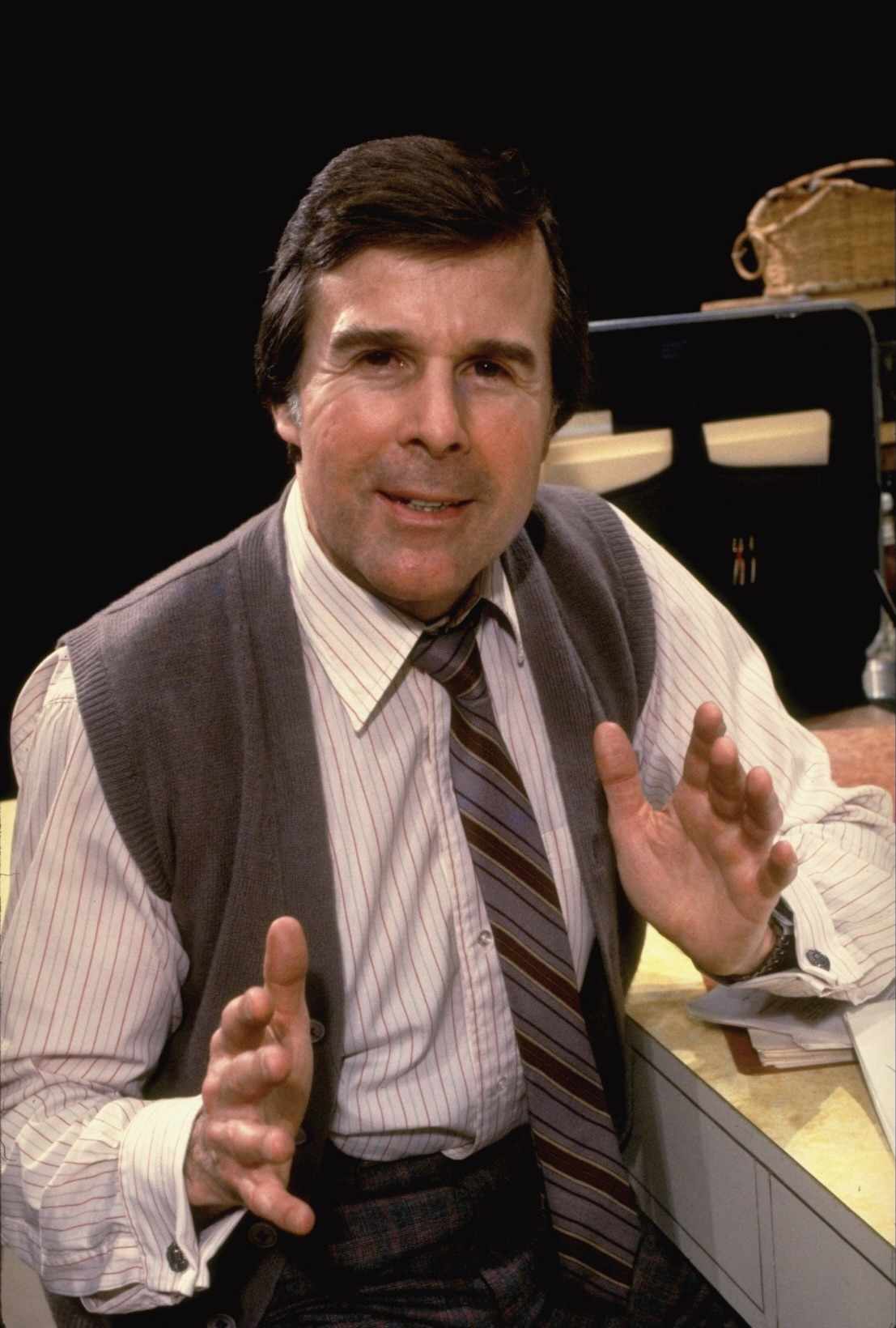















Write a comment ...